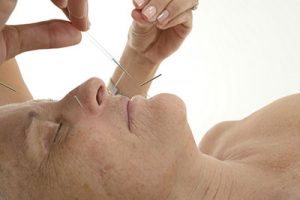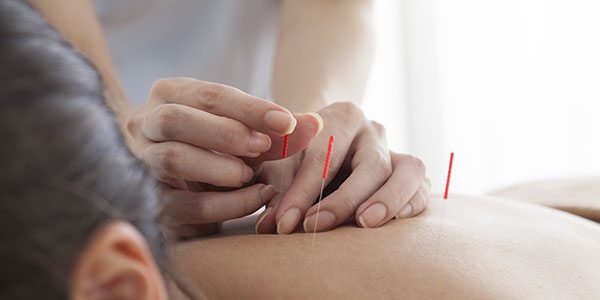Hormonal changes during menopause cause most women to experience unpleasant hot flashes and night sweats. A study has found that acupuncture treatments can reduce the frequency of these menopausal symptoms.
Perimenopause typically begins to occur naturally in women in their late 40s. Periods begin to become irregular, diminishing gradually until they stop suddenly, often in the early 50s. During this time, the body and mind undergo many dramatic changes, most notably on the hormonal level. Though there is a common range of symptoms that affect females in this age range, each woman’s body and experience is different and unique, and there is no one-size-fits-all therapy strategy for minimizing symptoms. However, through trial and error and a chat with your doctor, you can find the right treatment to alleviate your menopausal symptoms, and it might be a whole lot easier than you think.
Symptoms of Menopause
Although menopause is a natural biological process, it often presents with symptoms that can severely impact a woman’s sleep cycle, mood, energy level, and overall general health. The ovaries begin to produce less estrogen and progesterone in the late 30s, causing fertility to decrease and menstruation to become irregular. These hormonal changes (that take place over the course of over a decade) produce a variety of signs and symptoms, including night sweats, chills, vaginal dryness, thinning hair, drier skin, decreased metabolism, and, probably most commonly, hot flashes.
Hot flashes cause a sudden feeling of heat in the body, irrespective of the temperature of the surrounding environment. Night sweats are simply hot flashes that occur during the night, when a women is trying to sleep. Nearly 80 percent of menopausal women report experiencing hot flashes, night sweats, or both during the menopausal phase of their life. Luckily, there are a variety of treatment approaches and options to help diminish these and other unpleasant symptoms of menopause.
Available Treatment Options
 Many women who experience severe, and often debilitating, symptoms during menopause seek out hormonal therapy. Currently, it is said to be the most effective treatment for hot flashes, targeting the menopausal symptoms at their core. However, hormone therapy does not come free from risks and adverse side effects. Bloating, nausea, headaches, mood changes, and vaginal bleeding are just some of the negative experiences that are often associated with the treatment, which drives many women to seek natural alternatives. While herbal supplements and remedies and simple dietary changes may work wonders for the body, they, too, can come with their own sets of side effects. Studies on these methodologies have also produced mixed results.
Many women who experience severe, and often debilitating, symptoms during menopause seek out hormonal therapy. Currently, it is said to be the most effective treatment for hot flashes, targeting the menopausal symptoms at their core. However, hormone therapy does not come free from risks and adverse side effects. Bloating, nausea, headaches, mood changes, and vaginal bleeding are just some of the negative experiences that are often associated with the treatment, which drives many women to seek natural alternatives. While herbal supplements and remedies and simple dietary changes may work wonders for the body, they, too, can come with their own sets of side effects. Studies on these methodologies have also produced mixed results.
Recent research, though, has explored the effects that acupuncture can produce in a menopausal body. The results showed that many women experienced a decrease in symptoms, most notably in hot flashes and night sweats, after undergoing acupuncture treatments compared to those who did not. In fact, their frequency was reduced by a third and lasted for a minimum of six months. Though the treatment did not work for everyone, those who did benefit from it reported a strong reduction in symptoms during the first few weeks.
Facts About Acupuncture
Acupuncture has its origins in ancient Chinese medicine. In the East, it’s been practiced as a reliever of chronic tension and pain for thousands of years. The practitioner uses thin needles to stimulate specific, strategic points on the body. It works by acting on the neurovascular systems, nurturing the organs through the blood and tissues. Very few complications are ever reported as a result of the procedure, and the treatment is considered to be painless.
Experts are not completely sure why acupuncture can reduce menopausal hot flash symptoms, but they do have some ideas. Some speculate that the needle pricks trigger the production of hormones that regulate mood and stress. Others believe that the procedure causes blood vessels to dilate while stimulating the release of natural painkiller endorphins. Furthermore, they suspect that acupuncture treatments have a direct effect on the hypothalamus, the area of the brain that plays a large role in sending messages to regulate body temperature.
Acupuncture may work in conjunction with regular medical care. Always discuss options with your doctor before embarking on any treatment journey.





